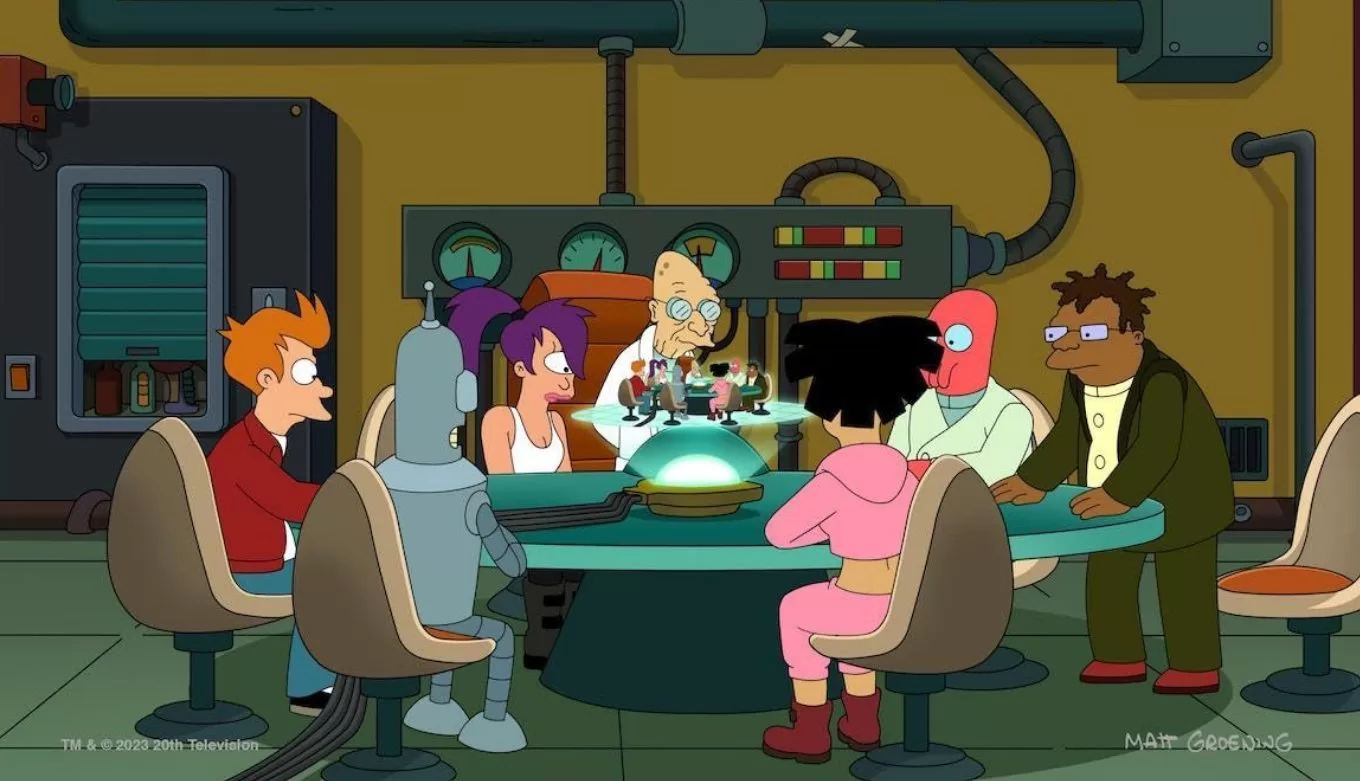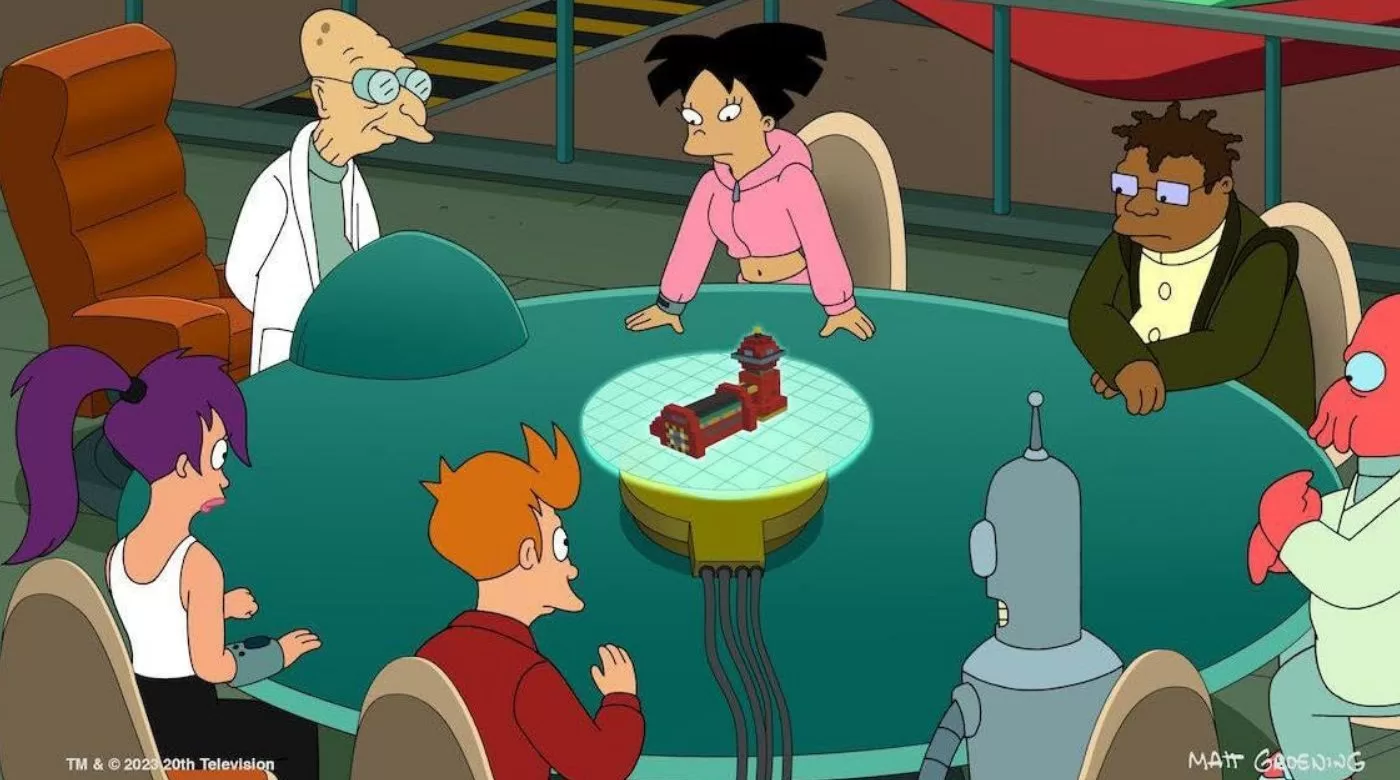The question of reality is nothing new, especially in the sci-fi landscape, but where many shows and movies treat it as a sinister, even selfish twist, this week’s Futurama takes a less dramatic approach. Granted, there’s still drama to be had but it is a surprisingly contained amount.
We begin with the Professor announcing he has created a simulation of the entire known universe. And, since this is a god level accomplishment, naturally his focus is on the simulated Planet Express crew. At first the simulation is highly pixelated – making it entertaining to watch but easy to dehumanize. Though, Leela is able to sympathize enough with her and Fry’s 3-bit selves to cover them up as they “go at it like two packs of gum”. Still, the Professor’s creation sparks Amy’s curiosity and her persistent observations eventually lead him to change his stance on whether our reality could be a simulation. That’s science for you, always bending to reasonable arguments and new evidence!
More importantly, Amy’s questions lead to Bender’s existential crisis. He is, after all, an artificial intelligence how must that knowledge affect him? Technically it shouldn’t, because by definition robots are not actually A.I., which brings me to an interesting curiosity. As a fan of shows and movies that incorporate robotic characters the presentation of these entities tends to go one of two ways: Robots are NOT A.I. and thus only have a “personality” based on the personification of them by their users/owners, etc. Or: Robots ARE A.I. and have a weird level of autonomy. Star Wars is a good example of this – where droids seem to do as they are programmed or told, yet not always quietly. It reminds me of slavery in that way. I mean, where do droids sleep? Do they sleep? Do they get paid? One episode of The Mandalorian featured a droid bar…how the fuck does that work? At least in Star Trek the android Data is clearly an A.I.. The Borg, while technically a cybernetic organism, acts like an A.I. gone rogue similar to Brainiac from the D.C. comics universe.
Further confusing things is the fact that, although Bender has largely been shown to be an independent minded robot, he has had moments where programming takes over. At one point in his history, he’s become a mindless automaton, only restored to his colorful self through an errant spark with Fry (think of Wall-E going soulless until Eva sparks with him in Wall-E). And, there was even an episode which contained a character named Robot 1X, which acted like a classic robot and was, conveniently, never seen again in the series. Bender’s fear that he isn’t real because of his programming is partially understandable, but mostly unfounded. Still, for the purposes of this episode it allows him to sympathize with the simulations to the point he makes the Professor swear to keep them alive and ignorant of their reality.
Farnsworth is not pleased about this, but goes about saving their universe through a truly disgusting solution. See, running a simulation of the entire known universe, even at such a low resolution, requires a shitton of computing power, and in order to keep it going the Planet Express building would require some kind of hydroelectric power source…cut to the Professor’s on-the-John explanation of how he can harness the city’s sewer lines – which they do – to keep the simulation running and at a higher resolution! This visual improvement means a better show so everyone tunes in to watch their adventures until the unthinkable happens. The simulated Planet Express crew’s Professor has created a simulation of the known universe and it is highly pixelated.

Naturally, things play out very close to how they do in reality. Except, because they are a simulation a power fluctuation grants more weight to their contemplation of reality leading to a drastically different direction. Instead of simulated Bender pulling focus towards himself, simulated Amy proposes a way to test if their reality is real. If they are living in a simulation, then doing something that the computer couldn’t possibly simulate should cause glitches in the universe, but what could that something be? Oh…how about collapsing a Magnetar? Still, do they want to know? Kind of, not really, but they’ll always wonder so now they have to know.
The Professor confirms that if the simulations can collapse the Magnetar their knowledge of their simulated existence can’t be avoided, however Bender decides that he wants to be the one to tell them about their truth since he can understand it best. The Professor makes it so Bender can go into simulated Bender’s body – which would drive simulated Bender’s consciousness into the sub-simulation and so forth and so on – but warns him it’s a one-way trip. There’s no way Bender can return to our reality, still, the robot feels he belongs in “Baloney town” and takes the plunge.
Down in Baloney town, the Magnetar is close to collapse, so Bender prepares to tell his fellow A.I.’s of their existence when simulated Fry makes a rousing speech about how “being” real isn’t as important as “feeling” real. Bender is so moved that he manages to return to his real-world body and give the Professor the information he needs to solve the simulation’s power problem (apparently trying to simulate an improbable event really isn’t in the Simulatron’s wheelhouse). By downclocking the processor speed, the simulation now requires much less power and time moves incredibly slow (slower than bureaucrat speed!) compared to our world. This has the added consequence of making the simulation unwatchable and while the Planet Express crew doesn’t get to see the outcome of the simulations’ experiment, we do…or do we?
I’ve been thinking about it and although the episode ends with simulated world glitching as the Magnetar collapses, I was wondering if it’s really because of the Magnetar’s collapse. The Professor says that while time passes normally for the simulations, decades or even centuries can pass in our time. This means it’s completely possible that the simulations’ world collapse isn’t due to their experiment but because of some unknown outside force in our world. After all, where is Planet Express in 100 years? It is entirely possible that the glitching happens because someone else comes along and ends the simulation’s run.
For me, this is arguably the best episode of the season. I may have said that about a previous episode, and I’m sure it was fantastic, but this one really captures the philosophical and dramatic strengths that have allowed this show to rise from the dead time and time again. Leela and Fry’s gradual yet never completed kiss is icing on the cake of a storyline that poses some truly excellent existential questions which, though tackled by other shows and movies, is given a much-needed dose of heart here. I compare this to Rick and Morty’s episode about creating universes, and how cynical it is.
My only complaints? Again, with the hated of Zoidberg? Also, do Fry and Leela really not close their eyes as they get closer to touching lips!? Otherwise, five stars, easily. Looking forward to the next season.

